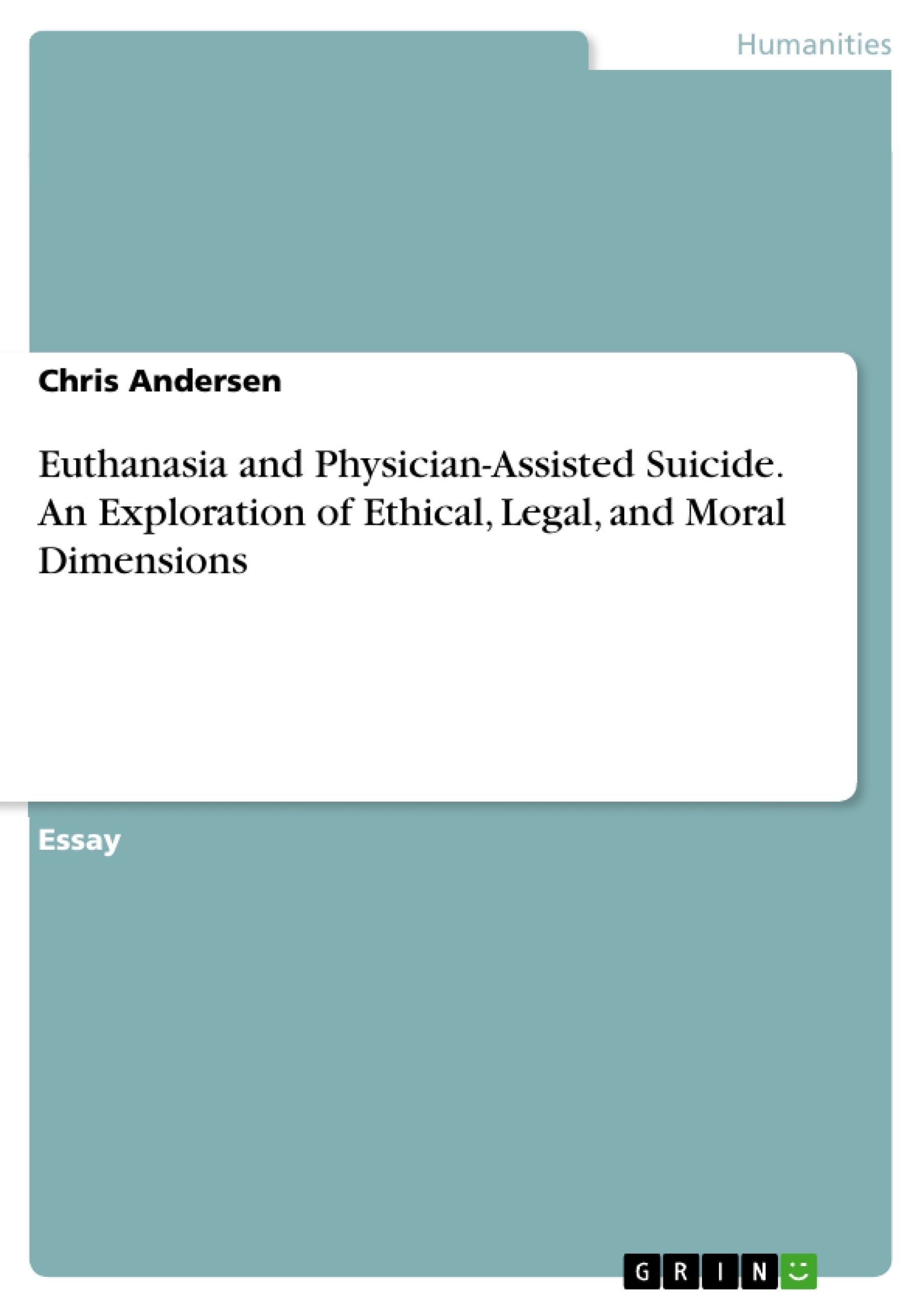The discourse surrounding euthanasia and physician-assisted suicide delves deeply into multifaceted ethical, legal, and moral dimensions, prompting a rigorous analysis of the subject. This study examines various ethical frameworks and concepts, including autonomy, patient dignity, and the sanctity of life, as foundational principles in the euthanasia debate. Central to the analysis are conflicting perspectives such as the preservation of life versus patient autonomy, the responsibilities and dilemmas faced by healthcare professionals, and the intersection of legal and ethical standards. Key ethical theories, including Aristotle's Golden Mean, Utilitarianism, and Natural Law Ethics, are evaluated for their applicability and limitations in addressing the complexities of euthanasia. The study underscores the importance of recognizing the inherent human dignity and autonomy of patients, advocating for a compassionate yet legally and ethically sound approach. Ultimately, navigating the ethical intricacies of euthanasia necessitates a nuanced understanding that balances individual rights, societal values, and medical ethics, emphasizing the need for informed and compassionate discussions in end-of-life care.
Inhaltsverzeichnis (Table of Contents)
- Introduction
- Key Terms
- Analysis of Conflicts or Controversies
- Autonomy vs. Sanctity of Life
- Professional Responsibility
- Legal and Ethical Standards
- Professional Codes of Ethics
- Conflicts Between Duties
- Loyalty to Self and Community or Nation
- Moral Course of Action
- Justification
- Personal and Social Ethical Considerations
- Integration and Analysis
- Application of Ethical Theories
- Aristotle's Golden Mean
- Utilitarianism
- Natural Law Ethics
- Ethical Theory Evaluation
- Conclusion
Zielsetzung und Themenschwerpunkte (Objectives and Key Themes)
This study examines the ethical, legal, and moral complexities surrounding euthanasia and physician-assisted suicide. It aims to analyze various ethical frameworks and concepts, including autonomy, patient dignity, and the sanctity of life, within the context of this controversial topic. The study focuses on balancing individual rights with societal values and medical ethics.
- The interplay between patient autonomy and the sanctity of life.
- The ethical dilemmas and responsibilities faced by healthcare professionals.
- The intersection of legal and ethical standards in the context of euthanasia.
- The application of key ethical theories, such as Aristotle's Golden Mean, Utilitarianism, and Natural Law Ethics.
- The importance of recognizing human dignity and autonomy in end-of-life care.
Zusammenfassung der Kapitel (Chapter Summaries)
The introduction explores the ethical, legal, and moral questions surrounding euthanasia and physician-assisted suicide, highlighting the complexities of the debate. The chapter defines key terms such as euthanasia, physician-assisted suicide, autonomy, patient dignity, and legal and ethical standards, providing a foundation for the analysis.
The next section delves into conflicts and controversies, examining the clash between the ethical principles of autonomy and the sanctity of life. It then explores professional responsibilities, legal and ethical standards, and the role of professional codes of ethics in addressing these challenges.
The study continues to examine conflicts between duties, specifically those faced by healthcare providers in relation to end-of-life decisions. It also addresses the complex issue of loyalty to self versus loyalty to community or nation.
The chapter on "Moral Course of Action" explores the most ethical approach to navigating these conflicts, emphasizing support for patient autonomy while upholding compassion and dignity.
The justification section underscores the core ethical concept of respect for autonomous life and its role in medical ethics.
The study further delves into personal and social ethical considerations, focusing on the Kantian perspective of the categorical imperative and its implications for the morality of euthanasia.
The chapter on integration and analysis examines the various ethical viewpoints and their implications for the practice of euthanasia.
Finally, the study explores the application of ethical theories such as Aristotle's Golden Mean, Utilitarianism, and Natural Law Ethics to the complex issues surrounding euthanasia.
Schlüsselwörter (Keywords)
The core keywords and focus topics of this study include euthanasia, physician-assisted suicide, autonomy, patient dignity, sanctity of life, ethical frameworks, legal and ethical standards, professional responsibility, moral dilemmas, and the application of ethical theories.
- Arbeit zitieren
- Chris Andersen (Autor:in), 2023, Euthanasia and Physician-Assisted Suicide. An Exploration of Ethical, Legal, and Moral Dimensions, München, GRIN Verlag, https://www.grin.com/document/1438548



